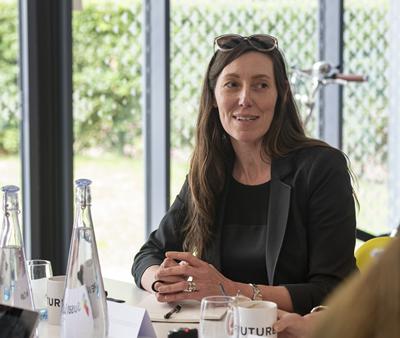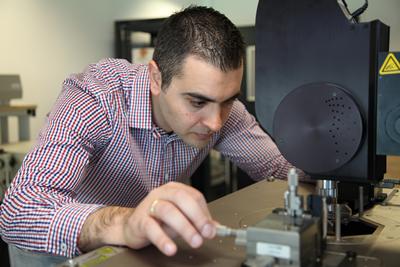Global visionaries from Southampton awarded funding to advance emerging technologies

Two world-leading academics from the University of Southampton have been awarded Chairs in Emerging Technologies by the Royal Academy of Engineering (RAEng) to support their disruptive innovations.
Professor Susan Gourvenec and Professor Themis Prodromakis are amongst eight UK-based researchers to share funding worth a total of £22 million to support innovations with the potential to considerably benefit society and the UK economy whilst enabling the nation to remain at the global forefront of engineering innovation.
The areas of research funded reflect the UK’s wider technological priorities, with many of the projects directly aligned to the government’s Industrial Strategy and designed to tackle some of the biggest industrial and societal challenges of our time. The RAEng Chairs in Emerging Technologies are supported through the UK government’s Investment in Research Talent initiative. The ten-year support provided to the Chairs will enable them to progress their pioneering ideas from basic science through to full deployment and commercialisation.
Professor Bashir Al-Hashimi, Dean of Engineering and Physical Sciences said, “These highly prestigious awards by the RAEng enable world-leading and visionary academics to address some of the key challenges humanity and our planet are facing. Science and engineering have significant contributions to solving these challenges and the research at Southampton led by Professor Gourvenec and Professor Prodromakis are testament to the impact and the relevance of their innovative approach to these challenges.”
Professor Sir Jim McDonald FREng FRSE, President of the Royal Academy of Engineering, said: “Engineering is critical to the research and innovation process, enabling the generation of tangible economic benefits for the nation. Emerging technologies offer enormous opportunities for the UK, both economically and socially. Investment in these areas will help us to stay competitive in the global marketplace and to establish a foothold in developing future markets. The quality and vision of those receiving the awards are testament to the outstanding research talent in the UK. It is essential that we support both the innovations and the pioneering individuals who will transform their ideas into fully commercialised technologies with important and widespread applications.”

Professor Susan Gourvenec
Intelligent & Resilient Ocean Engineering
Professor Gourvenec will drive forward Intelligent & Resilient Ocean Engineering by addressing technology gaps at each stage of the engineered life cycle of ocean structures - from forecasting ocean and seafloor behaviour, to designing and operating novel platforms for ocean facilities.
By harnessing the intelligence of sensing, robotics and autonomy, this next generation of resilient engineered systems will unlock ocean resources more efficiently and more sustainably, with less risk to life. The award will also provide Professor Gourvenec with sustained support to develop a Centre of Excellence in Intelligent & Resilient Ocean Engineering.
Professor Gourvenec said, “We will need to rely more and more on the oceans for energy, food and transport to meet the needs of an increasing and increasingly wealthy global population. Smart, safe and sustainable ways of harvesting the wealth of the oceans while protecting their health are essential. Oceans are a critical ecosystem for a healthy planet and irresponsible or over utilization of the oceans would be catastrophic for humanity. Emerging technologies of sensing, robotics and big data have immeasurable potential to improve the safety of engineering operations in the ocean for workers and the environment, and open up new approaches to design and operations.
“The UK has immense renewable energy resources to provide clean, green energy to the UK and its neighbours, as well as opportunities for other uses of ocean space from tidal stream aquaculture to floating ports, which will create jobs and wealth for the nation. Ocean engineering expertise, manufacturing and service industries exist across the nation from our mature oil and gas industry and transitioning this strength along with building new capabilities to support clean growth through new ocean technologies are key aims of this Chair. The Centre of Excellence in Intelligent & Resilient Ocean Engineering created through this Chair will be a hub for these activities.”

Professor Themis Prodromakis
Memristive Technologies for Lifelong Learning Embedded AI Hardware
Professor Themis Prodromakis will focus on Memristive Technologies for Lifelong Learning Embedded AI Hardware, using innovations in nanotechnology to create a new electronic fabric that merges memory with computing power while maintaining extreme power efficiency – like the human brain.
His research, using memristors or memory chips based on transition metal-oxides, will focus on enabling electronic systems to sense, recognise, learn and reason, with the goal of embedding artificial intelligence.
Professor Prodromakis said, “As evidenced by the government’s recent, £1bn deal with industry for the development of cutting-edge AI within the UK, this programme comes at a very timely moment.
“Artificial Intelligence (AI) is destined to transform our society, affecting every aspect of our lives. However, a key bottleneck towards the proliferation of the technology is the lack of efficient hardware that will allow us to embed AI everywhere – well beyond the cloud’s reach.
“The specific needs of embedded AI solutions place traditional systems under excessive strain. At the same time, the need for intelligent assistants, connected sensor networks and smart surveillance are pushing the boundaries for more powerful and more efficient hardware for AI that can deal with modern society’s needs for real-time data processing and the ability to adapt continuously (life long learning) under resource-constraint environments.
“This award will enable me to consolidate my established track-record in metal-oxide memristor technologies and provide sustained support (and gravitas) for advancing this technology to neuromorphic application solutions, using electronic analog circuits to mimic neuro-biological architectures.”